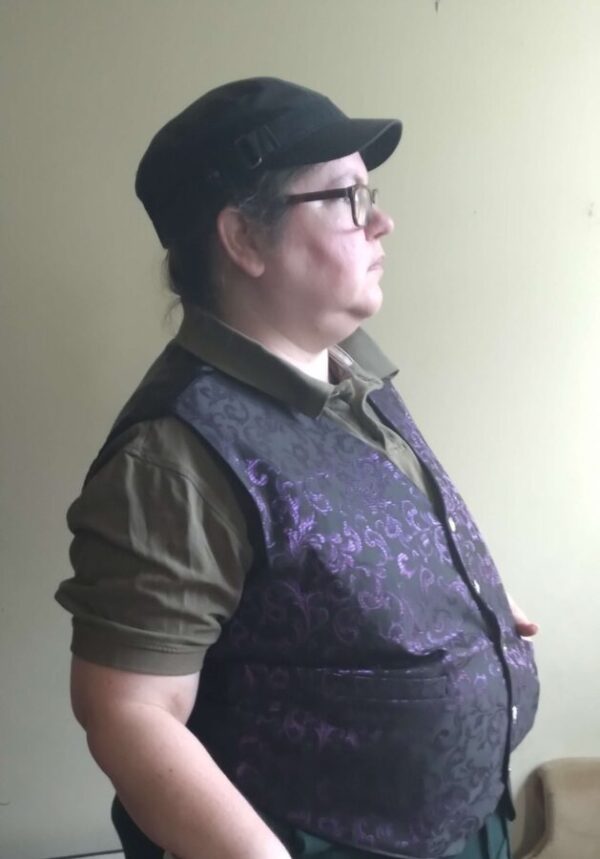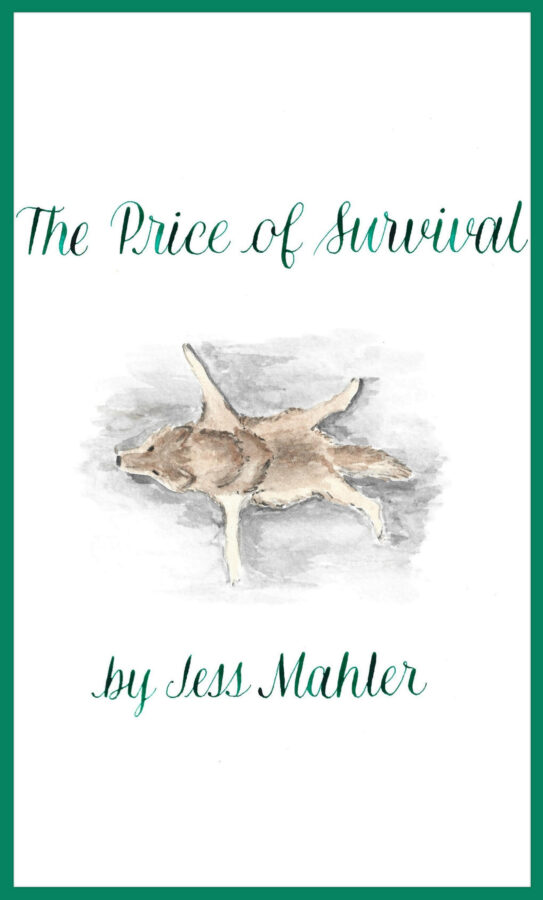
Welcome to my weekly Author Spotlight. I’ve asked a bunch of my author friends to answer a set of interview questions, and to share their latest work.
Today: Jess’ weird fish-out-of-water life has left them with an enduring love/hate affair with common tropes. The relationship counselor recommended they break it off, but they just keeps coming back to play with tropes (and fuck them up) some more.
In between their tropic indulgences, they write queer fantasy with aromantic, neurodivergent, and generally ‘weird’ characters, take care of their family, argue halakha, and try to do a bit of educational activism on the side.
Their website (https://www.jessmahler.com) updates semi regularly, and they’re active on Tumblr, Mastodon, and a few other spots around the web.
Thanks so much, Jess, for joining me!
J. Scott Coatsworth: How would you describe your writing style/genre?
Jess Mahler: That is not an easy question to answer!
For genre, I usually stick to speculative fiction, but I’ve delved outside it a few times, as with my last book, What You Will: A Queer-er Shakespeare, which is a, well, queered retelling of Shakespeare’s Twelfth Night.
Writing style?
Well, character-centered, but beyond that what I do doesn’t fit well within normal literary terms. I reject the idea that stories must have a central conflict, and instead, most of my stories follow a central growth arc. There often isn’t a climax and the ending may come in a way or time that doesn’t fit the expectations of most American readers.
JSC: If you could tell your younger writing self anything, what would it be?
JM: Keep writing. People kept telling me that it wasn’t worth it to pursue writing as a career and I needed to find something ‘real’. What they never told me was that even if I couldn’t get a career as a novelist, there were lots of writing career options like technical writing, copywriter, grant writing… things I could have pursued while working on my fiction writing that would have suited me so much better than everything else I tried.
JSC: What do you do if you get a brilliant idea at a bad time?
JM: It goes in the Mason Jar file. I’ll write it up in as much detail as I can, and save it in a text file. When I’m ready for a new story, if I don’t have a fresh idea, I’ll flip through the mason jar and see what catches my interest.
JSC: How long have you been writing?
JM: I like to say longer than I can remember. My mother had a short poem she says I wrote when I was 3. But for ‘taking my writing seriously’, I wrote my first attempt at a novel in high school. It was partly inspired by a young adult sci-fi story about a world where the first crops of the new colony grew in as crystals and everyone was afraid there would be nothing to eat, and partly inspired by David Weber’s treecats from the Honor Harrington series. Luckily, there are no remaining copies. 😉
JSC: Are there underrepresented groups or ideas featured if your book? If so, discuss them.
JM: It’s subtle, but the story in The Price of Survival is heavily influenced by Jewish history. It reflects the way throughout history Jews have ‘surrendered’ to live under the rule of and surrounded by our enemies, in hopes that /these/ enemies will be less likely to try to kill us all than /those/ enemies.
The story follows three wolves as they adapt – the former Pack Father, one of his lieutenants, and a normal wolf, Elizabet. Each of their stories reflects a different way Jews throughout history have survived — being put in a ‘middle minority’ position, moving away from immediate danger, and making personal connections that make survival possible. In the meantime, the wolves as a whole are moving to set up an enclave of their own within the territory of their enemy — another common thing in Jewish history.
Unusually for me, The Price of Survival doesn’t have any explicitly queer or disabled characters. There is, however, an inherent queerness in the werewolves, where the wolf and human are entirely distinct personalities and may be different sex and/or gender from their other half. For instance, Pack Father Navin is a man in human skin, but he refers to his wolf as his sister. Navin’s wolf half is female and is referred to with she/her pronouns in wolf skin.
JSC: What were your goals and intentions in this book, and how well do you feel you achieved them?
JM: We really have a tendency, as a society, to believe in complete victory. In defying the odds and heroically overcoming. With this story, I wanted to explore how people cope when that isn’t possible. What do people do, as individuals and as a people, when survival comes at a price no one would willingly pay?
I think I achieved it fairly well to start. I do want to explore these ideas and this world more, and I have plans for three novella-length sequels, each focusing on a different character from The Price of Survival.
JSC: What’s your writing process?
JM: My process changed radically about a year ago when I picked up a writing partner. Raidon T. Phoenix and I started writing together last November and intend to continue working together as long as we can.
We start out writing a rough draft together. We pull up a chat program and just start writing. Sometimes we’ll split up the characters and kind of role-play out the story, other times we’ll go paragraph-by-paragraph or whatever feels best for a given story.
We write in chunks aiming for about 10k-15k at a time. Once a chunk is written Rai will go through and flesh it out, adding more description or visual details. Any major problems during fleshing out mean we re-write a section of the story.
When the fleshing out is done, I do a first run of line edits. I clean up word choices, tweak phrasing, and check grammar and spelling.
That gives us a finished first draft, which gets divided up and posted as a serial fic on our website. Each chunk is one season of a story, and stories run from one to six seasons. When the story is finished, we pull everything together and put it through another round of edits to get it ready to publish as an ebook.
JSC: What other artistic pursuits (it any) do you indulge in apart from writing?
JM: I weave. Mostly I do tablet weaving, which works best for making bands like guitar straps or dog leashes. The smaller loom for tablet weaving fits on my desk right where my keyboard usually sits and I can work while watching videos or listening to music.
Tablet weaving is wonderful for creating intricate patterns or complex designs, and I’ve done some of that. But I also like making relatively simple designs like pride flag bands. I’m working on a band in the colors of the ace pride flag right now.
JSC: We know what you like to write, but what do you like to read in your free time, and why?
JM: Mostly I read fluff. Light, fun stuff that I can just relax and enjoy without thinking too much. Heavy on the queer romance and the polyamorous romance, but also lots of fantasy.
In between the fluff I read ‘learning’ books. I recently read several books from the Harvard Kennedy School ‘Racial Justice, Racial Equity, and Anti-Racism Reading List’ and I’m currently working through People Love Dead Jews by Dara Horn. It’s honestly a pretty rough read, and I’m going to follow it up with something ‘light’ like South East Asian history or something. (I have a Korean friend who is always sharing the most fascinating historical anecdotes and I want to learn more.)
JSC: What are you working on now, and what’s coming out next? Tell us about it!
I’m currently wrapping up the last season of Planting Life in a Dying City, which one reader has compared to LeGuin’s work in the way it explores how family and society might work in a world without gender. It’s a low fantasy bronze-age found-family story about coming together and building anew after trauma and destruction. If all goes well, Planting Life will be the last story I write without Rai, so that’s a lot of feels there.
Rai and I are also working on the second season of Mighty Hero Force Epsilon, which is inspired by the sentai stories of Japanese anime, with our own unique twist. Epsilon is a lot lighter than our usual work, and we’ve had a lot of fun playing with the characters and their powers.
Folks who want to follow these stories as serials can find them at https://story-aerie.com
Coming out next is Meadowsweet, a novella that’s kind of sci-fi romance meets Firefly. It’s also the closest to erotica I’ve ever written or am ever going to! Definitely a stretch project, but I had fun with it.
And now for Jess’s new book: The Price of Survival:
Not every fight ends with glory and honor: sometimes the best you can do is live on.
Just when the wolves of Long Valley thought the war couldn’t get any worse, a sneak attack cost them everything. Assaulted on two fronts and looking down the abyss of total extinction, the Pack Father will offer full surrender to the lesser of two evils. Now, forced to serve their conquerors and ground down daily into the dirt of humiliation and desperation, the pack will discover: can they afford to pay the price of survival?
Pack Father Navin must live with the ‘choice’ he made for the pack. Pack Second Cyneburg must bow to the conquering general who will use her authority but refuse to heed her words. Elizabet must face bringing a child into a world that cares nothing for them. Follow them as they struggle on and reach — uncertainly, painfully, endlessly — for some hope of continuation and a new beginning.
Because the true price of survival is this: you need to find a way to go on afterward.
Amazon | Smashwords | Universal Buy Link
Excerpt
Navin Wolf, Pack Father of the Long Valley Wolves, strode into the court of Queen Alfhard as if he owned it. Looking neither at the gaping courtiers surrounding him nor the soldiers who escorted him. He looked only at Alfhard. She would have called his stare a challenge except he did not meet her eyes.
When he reached the foot of the dais, he stopped and waited. Alfhard studied him for a moment. He was smaller than she expected. Slight, with a hint of fat in his cheeks and belt, but hard, for all that.
Her examination didn’t bother Navin; he’d expected it. The wolf within him paced fretfully. They knew what was to come, Navin and his wolf. And neither of them liked it.
The herald belatedly announced him and his purpose, “…come to offer surrender on behalf of the Long Valley Wolves and all of their pack.”
Alfhard had known, of course, that the offer of surrender was coming, but she had expected a messenger, not the Wolf himself.
That he put himself in her hands without even a promise of safe conduct spoke of great trust or desperation. Possibly both.
“And what are your conditions, Pack Father?” she asked.
His eyes flickered, flashing golden for a moment before returning to their human brown. It startled Alfhard, who had heard all her life of the wolves but had never met one before. She was sure it meant something but didn’t know what.
“One condition only, Majesty,” he replied, the strain in his voice belying the calm on his face. “The life of my people.”

